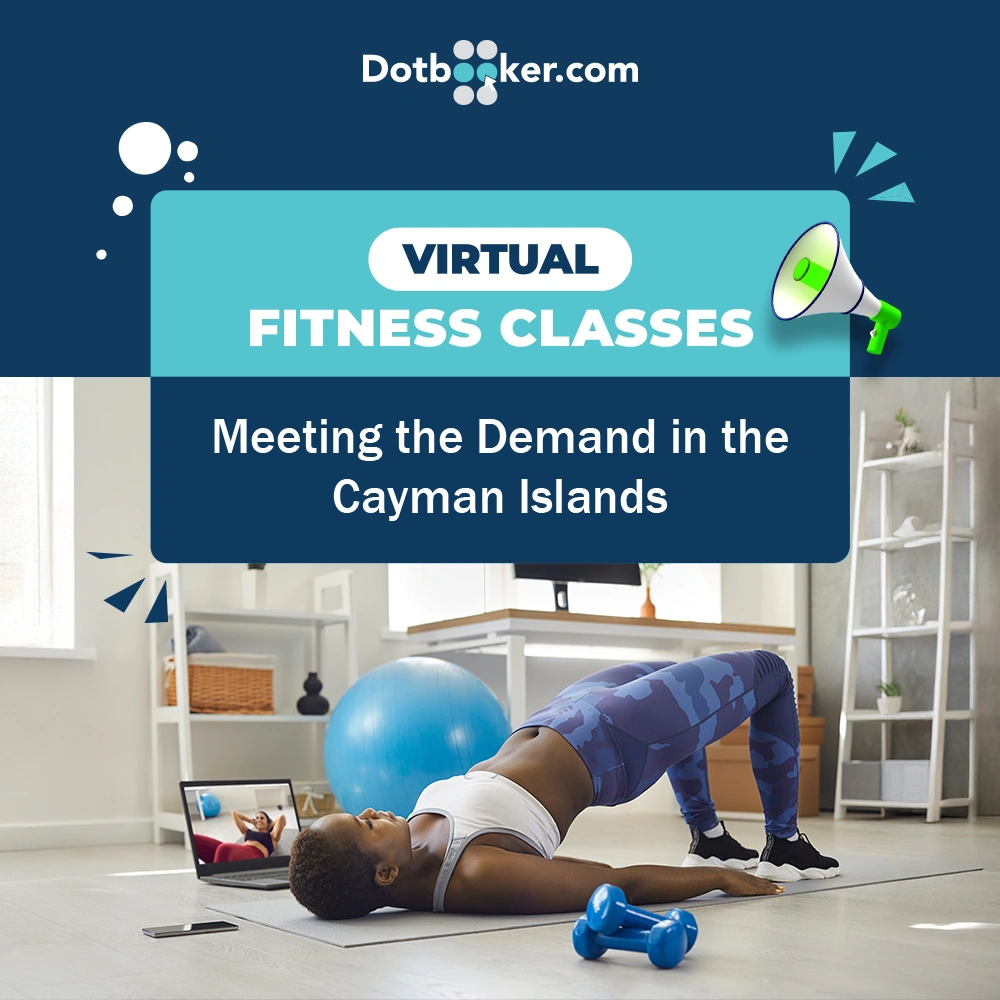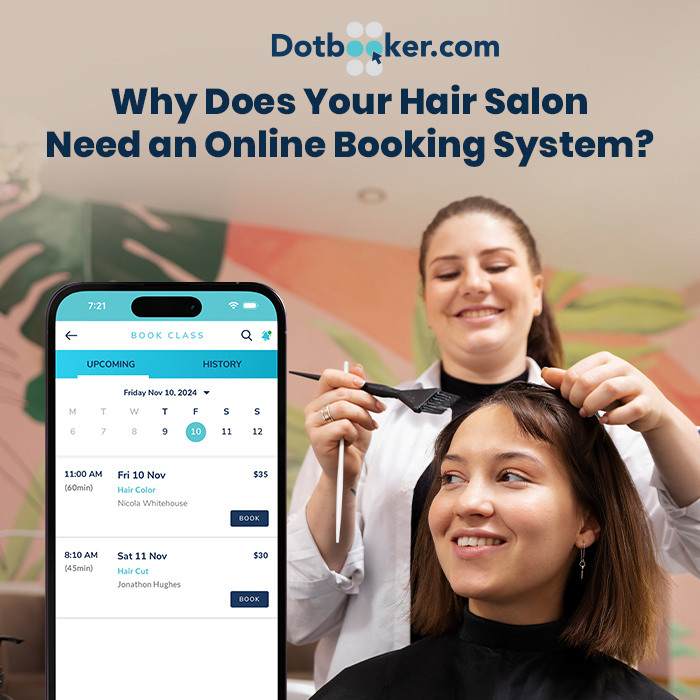
- By Dotbooker
- Mar 17, 2025
- 428
Virtual Fitness Classes: Meeting the Demand in the Cayman Islands
Imagine this: the turquoise waters of the Cayman Islands glisten under the Caribbean sun, but instead of heading to a gym, locals are breaking a sweat in their living rooms, on balconies, or even beside the beach — with a smartphone in hand.
That’s the reality of fitness in 2025.
Virtual fitness classes aren’t just a passing trend; they’ve become a cultural shift. And in the Cayman Islands — where wellness is as embedded in lifestyle as the island breeze — this shift turns into a full-blown movement.
So, what’s fueling this change? And why are Caymanians logging into Zoom classes instead of signing up at traditional studios?
Let’s decode the demand.
Why Virtual Fitness is Booming in the Cayman Islands?
Let’s explore why virtual classes are booming on the Cayman Islands.
1. Lifestyle-First Culture
In the Cayman Islands, the pace of life is a unique blend of productivity and relaxation. Islanders prioritize their well-being and professional commitments, and that balance has created fertile ground for flexible solutions like virtual fitness.
People in finance, tourism, or government can squeeze in a 30-minute burn between Zoom calls or after the school run.
No traffic. No gym commute. Just convenience — and that’s priceless on an island where your time is best spent soaking in life, not waiting in line for a treadmill.
“No more rushing to beat traffic for a 6 PM spin class. Now, your spin class comes to you.”
2. Limited Access, Unlimited Reach
While George Town might offer high-end studios and wellness centers, outer districts like East End or North Side don’t always have the same luxury. Virtual classes erase these physical gaps.
Anyone with a phone and Wi-Fi can access world-class training, even if they live miles from the nearest gym. Moreover, virtual training platforms have enabled niche fitness practices (like Barre or Tabata) to gain traction in smaller communities that previously didn’t exist.
Rural access used to mean a long drive. Now, it just means opening an app.
3. High Tourist Turnover = New Fitness Habits
Tourism is the heartbeat of the Cayman economy. But it also brings a transient population — short-term renters, business travelers, and seasonal staff. This group often avoids traditional gym memberships due to short stays.
Virtual fitness fills that gap by offering pay-as-you-go or short-duration access. Some resorts have even begun partnering with local instructors to provide guests access to virtual classes that fit their schedule — from their hotel room, cabana, or villa.

What Virtual Fitness Looks Like (Cayman Style)
This isn’t just copying Peloton or Beachbody — Cayman’s fitness culture is carving its own identity in the virtual world.
- Live-streamed sunrise yoga from Seven Mile Beach, where instructors guide sessions with waves crashing in the background. It’s more than exercise — it’s an experience.
- Caribbean cardio with soca and reggae beats, encouraging high-energy movement blended with cultural rhythms. Think HIIT meets dancehall.
- Mindfulness meditations and breathwork sessions are scheduled midday for high-stress professions like law, finance, and healthcare. Many are even offered in “10-minute quick break” formats—perfect for busy workers.
- On-demand class libraries that reflect island culture, with trainers integrating marine stretches, snorkeling prep routines, and post-hike cooldowns.
Studios are also getting creative with interactive features:
- Two-way video feedback during sessions
- Class leaderboards for motivation
- WhatsApp or Telegram groups to foster accountability and camaraderie
For a small island, Cayman is showing the world how virtual doesn’t have to mean disconnected.
Who’s Tuning In?
It’s essential to know the individuals who are responsible for dealing with such virtual fitness classes.
🧘♀️ The Wellness Warriors
These are your early risers, green juice drinkers, and full-moon meditation types. They love virtual yoga, pilates, and holistic health workshops. For them, virtual fitness isn’t just about movement—it’s about alignment, intention, and community.
They often attend guided meditations at 6 AM and virtual retreats on weekends and participate in wellness challenges that span mindfulness, journaling, and movement.
💪 The Busy Bees
This group includes professionals working long hours — especially in finance, tourism, hospitality, and government. They often attend short but intense classes like 20-minute HIIT, strength workouts, or mobility sessions.
Most prefer pre-scheduled classes that send automated calendar invites and reminders. Their favorite features are the replay options and progress trackers. They don’t want fluff—just results, quickly.
🌎 The Digital Nomads
Since the Cayman Islands launched its Global Citizen Concierge Program, digital nomads have seen a noticeable uptick. These expats, freelancers, and remote workers often have existing fitness habits but no access to their preferred studios.
Virtual classes offer them familiarity and flexibility without requiring them to adjust to a new studio culture. They often introduce new fitness trends like animal flow, primal movement, and breath-focused conditioning.
👨👩👧👦 Families
Kids, parents, even grandparents — families are logging in together. Studios are now offering child-friendly yoga, family dance parties, and themed workouts (like “pirate adventures” or “superhero strength” for kids).
These sessions build bonding, boost fitness, and reduce screen-time guilt. Some platforms even let families filter content by age group, intensity, and instructor tone.
How Studios Are Adapting — Or Should Be
Adapting to virtual doesn’t just mean recording workouts — it means rethinking the studio model altogether.
Successful Cayman-based fitness studios are:
- Rethinking pricing models with flexible options: single-class drop-ins, weekly bundles, and tiered memberships based on access.
- Creating branded digital experiences beyond the class: curated playlists, nutrition tips, community shoutouts, and feedback forms.
- We are equipping instructors with digital training, teaching them how to manage lighting, framing, audio quality, and engagement tools like polls or Q&A.
- Investing in mobile optimization — because many users log in via mobile devices, not desktops.
- Automate communications from class reminders and birthday shoutouts to feedback collection and re-engagement nudges.
Studios that haven’t embraced these practices are struggling to keep up. Their live classes have poor attendance, and their replays go unwatched. The virtual space rewards strategy, not spontaneity.
Tip: Studios are now hiring part-time virtual community managers to keep engagement high between sessions. This shift is serious.
What’s Next for Virtual Fitness in the Cayman Islands?
The virtual fitness revolution is warming up, and Cayman is at a strategic intersection of wellness and tech.
Here’s where we’re heading:
Hybrid Membership Models
Clients want the best of both worlds—in-person classes when they can and virtual access when they can’t. The flexibility of switching between formats is becoming a key differentiator for studios.
Wearable Tech Integration
Fitness platforms are integrating with Apple Watches, Fitbits, and Whoop bands, offering real-time heart rate monitoring and post-class analytics. Some Cayman instructors are already experimenting with this to enhance personalization.
Fitness + Travel Bundles
Tour operators are collaborating with local fitness brands to create vacation packages that include virtual sessions pre-arrival and in-person wellness experiences during the stay. Think "Train with us before you travel."
Wellness Retreats with a Digital Twist
Multi-day events where participants can join virtually or attend in person. Expect guided journaling, nutritional workshops, and virtual ocean-view meditations.
Localized Fitness Apps
Cayman-based developers are exploring white-label apps for studios to offer an integrated mobile experience — from booking to payment to class access — all branded.
Final Stretch: Where Does Dotbooker Fit In?
Behind every seamless virtual class, there’s an organized studio. And behind that studio? A powerful booking, scheduling, and client management system.
That’s where Dotbooker plays a silent but vital role.
With Dotbooker, fitness studios in the Cayman Islands can:
- Easily schedule virtual classes, automate replays, and sync sessions with calendar apps
- Enable guest access and tourist-friendly booking flows
- Automate reminders, class links, and cancellation policies to reduce no-shows
- Track attendance and engagement in both live and on-demand formats
- Offer tiered memberships, coupon codes, and promo campaigns
- Collect class feedback, testimonials, and performance analytics.
In short, Dotbooker empowers studios to scale without sacrificing the personalized, community-driven essence that makes Cayman's fitness culture unique.
In Closing
Virtual fitness isn’t replacing the gym; it’s reinventing how people in the Cayman Islands connect with wellness — on their terms, from their chosen space, and with their favorite island coaches.
So whether it’s sunrise yoga by the beach or a post-work HIIT blast in your living room, the fitness revolution is already here.
And with the right tools — like Dotbooker — it’s just getting started.
Popular Blogs

- Oct 20, 2022
- 5071

- Sep 08, 2024
- 4467

- Nov 11, 2022
- 3866

- Sep 16, 2024
- 3154
Transform your business now!

Get an expert consultation for your business's streamlined operations.